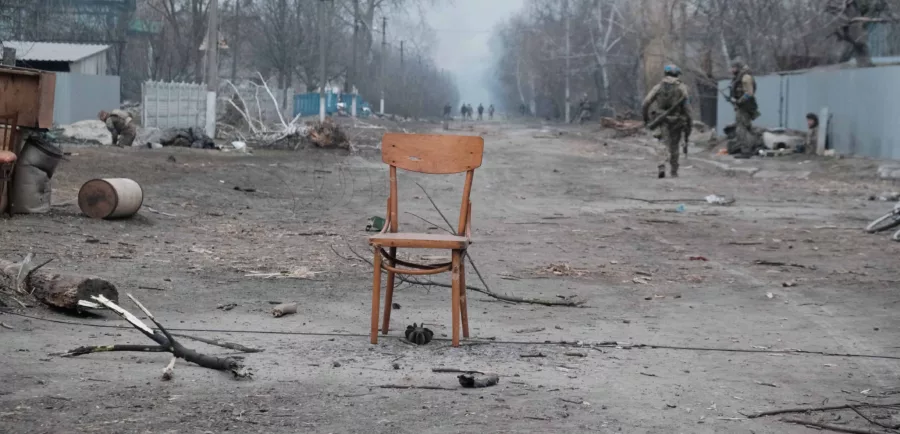Fellows seek justice for civilian victims of Russia’s war

While still faced with the ongoing horrors of the war in Ukraine, Oleksandr Vodyannikov has turned his attention to compensation for civilian victims, and bringing in international support.
Oleksandr is currently a consultant at Ukraine’s Law Reform Commission, which advises President Zelensky on the country’s legal system. He also participates in the justice working group of the National Council for Post-War Reconstruction of Ukraine, an advisory body established by Zelensky at the start of the war. The group is focused on how to finance rebuilding the country’s infrastructure, and Oleksandr believes the need to compensate civilian victims is an issue that is being overlooked.
“As of today, we do not have a unified mechanism for compensation,” says Oleksandr. “So far efforts have been focused on property damage. We need to establish a swift and effective compensation mechanism for all losses sustained by Ukrainians including those who have fled – mainly women and children. More than 20,000 claims have already been registered in the government system.”
Supporting survivors of war crimes
The draft mechanism is still in its early days and Oleksandr recognises that designing it will be no mean feat. He wants to draw on the experience and expertise of legal and other minds from Ukraine and the international community, including lawyers who have supported survivors of war crimes in seeking justice in historical conflicts. “I want to ensure the mechanism is innovative, effective and avoids the pitfalls of previous such mechanisms. My goal is to unite experience, efforts, and support in designing and advocating a compensation mechanism for Ukraine,” says Oleksandr.
To support Oleksandr in his goal, the John Smith Trust has connected him with other Fellows who have relevant expertise as well as with several legal experts from the UK and US. On 30 June, the Trust hosted a meeting during which Oleksandr presented his ideas to Fellows as well as UK and other international legal minds, including members of the USAID Justice for All programme. Oleksandr explained the pressing need for a compensation mechanism which would allow civilian victims of the war to bring claims for losses against the Russian Federation.
A key area that emerged as problematic was enforcement: any compensation mechanism would be of little use if there was no way of effectively enforcing it and securing damages. Barrister Toby Cadman – joint head of Guernica 37 Chambers which specialises in international criminal and human rights law – provided some valuable insights drawing on his experience, including as senior legal counsel to the chief prosecutor of the Bosnian war crimes chamber.
How to use frozen assets
The participants discussed how to satisfy claims using frozen assets, but Toby cautioned that this approach needs thinking through carefully. He said: “Fairly early in the conflict in Syria it was debated whether the assets of wealthy Syrian businessmen connected to the regime who had their assets frozen in the UK, US and EU could be taken and used in a compensation fund. But there is a risk that this becomes blood money, that those individuals may be buying their way out of prosecution by paying into a compensation fund.”
Already in relation to Russia’s war in Ukraine we have seen this dilemma arise with Roman Abramovich and the sale of Chelsea Football club. “Initially the profit from that sale was to compensate victims of the conflict in Ukraine,” said Toby. “Subsequently that was changed so that the profit would go to ‘good causes’ – quite a difference. It comes down to the will of the state in question to process frozen assets effectively.”
Another challenge to tackling the compensation issue is how to ensure Russia’s compliance with any court decisions. “It’s very difficult to ensure compliance by enforcement when Russia is on the UN Security Council,” said Toby. “It makes any form of UN-managed process all the more difficult. Any mechanism without enforcement becomes more of an academic exercise which won’t satisfy any claims.”
A multilateral approach to compensation
Participants agreed on the need to consider a multilateral approach, as is happening in Syria, with the international community putting pressure on Russia to comply.
Mark Ellis, executive director of the International Bar Association, said: “International law is clear and absolute. A state is prohibited from the use or threat of force against another state. This is to ensure that the territorial integrity and political independence of the state are not violated. All instances of the use of force by one state against another, regardless of gravity or aims, constitute a violation. This protective principle is inviolable and one of the most fundamental norms of international law.
“There are only two main exceptions to this principle – the state is acting in self-defence or acting pursuant to a United Nations Security Council resolution. Neither of these two exceptions is applicable to Russia’s actions against Ukraine. This violation, which is the crime of aggression, has now occurred. If the crime of aggression is to be prosecuted, then I believe the international community must be a part of that process.”
Following this meeting Oleksandr has formed a small working group who are turning their attention to the tricky question of enforcement. Watch this space for updates about the group’s progress.
If you’re interested in supporting Oleksandr’s initiative and feel you have relevant expertise, please do get in touch with Louisa Long at louisa.long@johnsmithtrust.org.
Photo by Oles Navrotskyi
